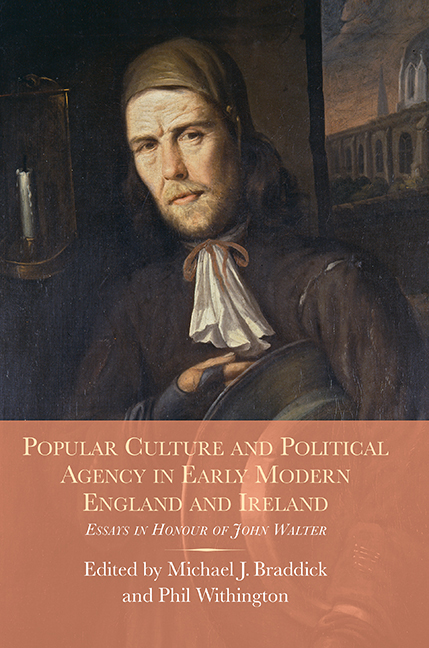 Popular Culture and Political Agency in Early Modern England and Ireland
Popular Culture and Political Agency in Early Modern England and Ireland Book contents
- Frontmatter
- Contents
- List of Illustrations
- List of Contributors
- Acknowledgements
- List of Abbreviations
- Introduction
- 1 John Walter and the social history of early modern England
- 2 Contrasting susceptibility to famine in early fourteenth- and late sixteenth-century England: the significance of late medieval rural social structural and village governmental changes
- 3 The politics of English political economy in the 1620s
- 4 Provision, household management and the moral authority of wives and mothers in early modern England
- 5 Popular senses of past time: dating events in the North Country, 1615–1631
- 6 Spectral lordship, popular memory and the boggart of Towneley Hall
- 7 Self-image and public image in the career of a Jacobean magistrate: Sir John Newdigate in the Court of Star Chamber
- 8 Gender, agency and religious change in early Stuart England
- 9 ‘A Standard which can never fail us’: the Golden Rule and the construction of a public transcript in early modern England
- 10 Religion, anti-popery and corruption
- 11 An ‘Aristotelian moment’: democracy in early modern England
- 12 John Lilburne and political agency in revolutionary England
- 13 An Irish Protestation? Oaths and the Confederation of Kilkenny
- 14 ‘Whereat his wife tooke great greef & died’: dying of sorrow and killing in anger in seventeenth-century Ireland
- Bibliography for John Walter
- Index
- Tabula Gratulatoria
- Miscellaneous Endmatter
10 - Religion, anti-popery and corruption
Published online by Cambridge University Press: 09 May 2017
- Frontmatter
- Contents
- List of Illustrations
- List of Contributors
- Acknowledgements
- List of Abbreviations
- Introduction
- 1 John Walter and the social history of early modern England
- 2 Contrasting susceptibility to famine in early fourteenth- and late sixteenth-century England: the significance of late medieval rural social structural and village governmental changes
- 3 The politics of English political economy in the 1620s
- 4 Provision, household management and the moral authority of wives and mothers in early modern England
- 5 Popular senses of past time: dating events in the North Country, 1615–1631
- 6 Spectral lordship, popular memory and the boggart of Towneley Hall
- 7 Self-image and public image in the career of a Jacobean magistrate: Sir John Newdigate in the Court of Star Chamber
- 8 Gender, agency and religious change in early Stuart England
- 9 ‘A Standard which can never fail us’: the Golden Rule and the construction of a public transcript in early modern England
- 10 Religion, anti-popery and corruption
- 11 An ‘Aristotelian moment’: democracy in early modern England
- 12 John Lilburne and political agency in revolutionary England
- 13 An Irish Protestation? Oaths and the Confederation of Kilkenny
- 14 ‘Whereat his wife tooke great greef & died’: dying of sorrow and killing in anger in seventeenth-century Ireland
- Bibliography for John Walter
- Index
- Tabula Gratulatoria
- Miscellaneous Endmatter
Summary
This chapter examines the rhetoric of corruption. It argues that the language of corruption in early modern England was religiously inflected; that anti-popery provided an important idiom for the articulation of ideas about corruption; and that this process was political, excluding some from exercising power as well as providing a powerful weapon against enemies, thereby providing a means of delegitimising their authority or reputation. Corruption and anti-corruption thus had agency, though the latter was something of a double-edged sword: attacks on corruption could provide powerful legitimation for those who made them, especially when wielded against office holders, but allegations of anti-corruption could also be dangerous when deployed back on those making them. Anti-corruption was thus, like the anti-popery it often incorporated, an enabling and powerful language that had political motivations and consequences. ‘Corruption’ was not a consensual and static category, but rather a contested and fluid one which easily became part of struggles between Catholics and Protestants and also between individuals or partisans contending for power. Corruption was thus one of the many early modern keywords available to both high and low as a means to blacken, castigate, condemn and delegitimise. The chapter therefore builds on John Walter's insights about legitimation and delegitimation strategies, and about the important role of religion in these. The first section examines anti-popery as a discourse that united many of the different ways of thinking about corruption that prevailed in the sixteenth and seventeenth centuries. The second half explores how this discourse was used in practice, underlining not only the power that anti-corruption had to bring down opponents, but also the risks in using the rhetoric of corruption because it was a weapon that was very difficult to control and monopolise.
These themes have a broader significance in relation to recent social science research into the role of religion in shaping perceptions of corruption. Building on Weber's classic thesis about a link between Protestantism and capitalism, such work has explored a possible link between religion and corruption in the modern world. At least six studies have found a correlation between Protestantism and low levels of corruption, and between Catholicism and high levels of it. Robert Putnam has suggested that the Catholic Church had an adverse effect on trust, because vertical bonds of clerical authority undermined horizontal bonds of fellowship.
- Type
- Chapter
- Information
- Popular Culture and Political Agency in Early Modern England and IrelandEssays in Honour of John Walter, pp. 181 - 202Publisher: Boydell & BrewerPrint publication year: 2017
